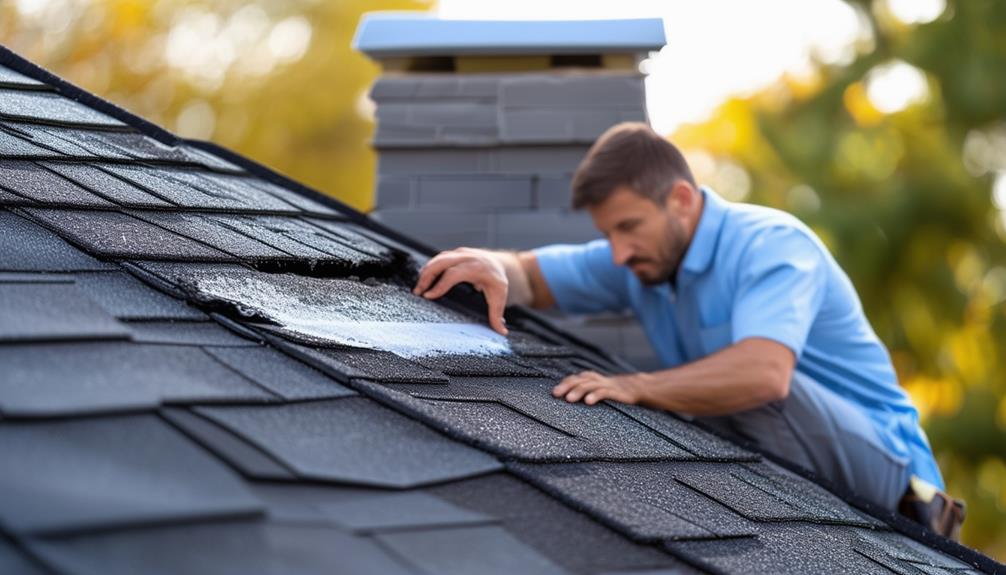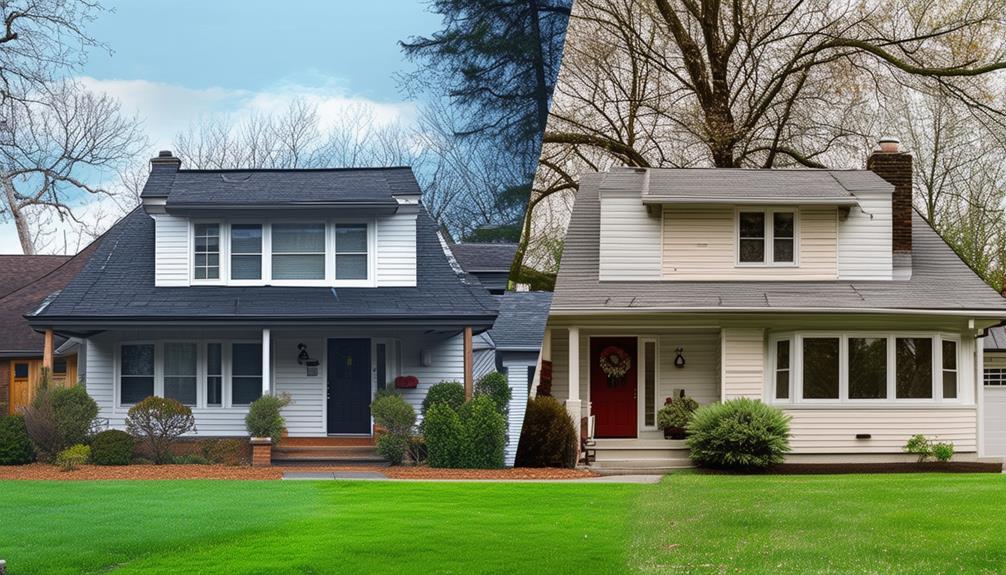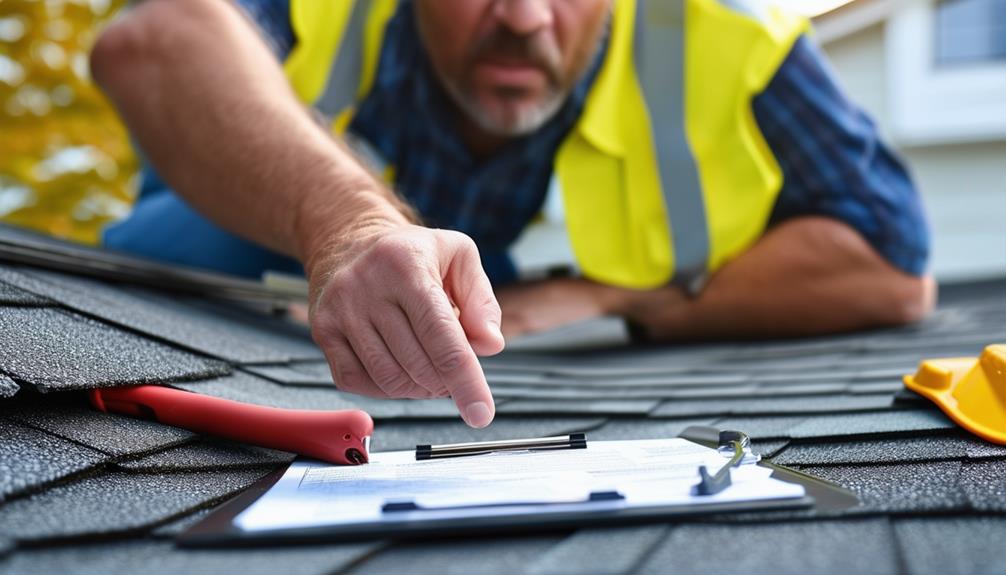In real estate transactions, grasp the essentials of roofing. Assess the significance of thorough inspection, discerning repair choices, and vetting contractor qualifications. These steps are pivotal for informed decisions that maintain property value and regulatory adherence. Understanding common roof issues, gauging repair versus replacement, and negotiating with professionals safeguard your investment and guarantee compliance. By acknowledging the impact of roofing on property value and grasping the role of experts in the process, you align yourself for success in real estate dealings.
Importance of Roof Inspection

Ensuring a thorough roof inspection is conducted is essential in real estate transactions to assess the structural integrity and potential risks associated with the property. Roofing maintenance is an important aspect of property upkeep, and a detailed inspection process can reveal underlying issues that may affect the value or safety of the real estate. The inspection process typically involves a professional contractor evaluating the roof for signs of damage, wear and tear, leaks, proper installation, and overall condition. This assessment is crucial for buyers, sellers, and lenders to make informed decisions regarding the property's value and potential liabilities. By identifying any roofing maintenance needs early on, both parties can negotiate repairs or adjustments to the sale price before finalizing the transaction. In real estate transactions, a thorough roof inspection is not just a recommendation; it is a necessary step to protect all parties involved and ensure a smooth transfer of ownership without unexpected complications.
Common Roof Issues to Identify
Identifying common roof issues is essential in real estate transactions to assess potential risks and structural integrity effectively. When it comes to evaluating the roof of a property, there are several key issues to lookout for:
- Leak detection: Water infiltration can lead to serious damage to the property's structure and interior. Identifying any signs of leaks or water stains is important.
- Structural integrity: Ensuring the roof's framework is sturdy and sound is essential. Look for signs of sagging, uneven roof planes, or missing/broken roof materials.
- Flashing problems: Damaged or improperly installed flashing around chimneys, vents, and skylights can result in water seepage.
- Roof age and wear: Older roofs may show signs of wear and tear, such as curling shingles, granule loss, or bald spots.
- Vegetation growth: Moss, algae, or mold growth on the roof can indicate excess moisture and potential roof decay.
Careful examination of these common roof issues can help in making informed decisions during real estate transactions.
Impact of Roofing on Property Value

When evaluating the impact of roofing on property value, it is essential to assess the roof's condition meticulously for its potential influence on the overall valuation of the real estate asset. The type of roof materials used and the adherence to current roofing trends can greatly affect the property's worth. Modern roofing trends often favor sustainable and energy-efficient materials such as metal roofing, solar tiles, or green roofs, which can enhance the property's appeal and value. Conversely, outdated or damaged roofing materials like deteriorating shingles or leaks can deter potential buyers and decrease the property's value. Understanding the role of roofing in property valuation is vital for real estate transactions, as it directly contributes to the property's curb appeal, structural integrity, and long-term maintenance costs. By staying informed about roofing trends and ensuring the roof is in good condition, property owners can positively impact their property's value in the real estate market.
Roof Repair Vs. Replacement
Evaluating whether to repair or replace a roof is an important decision that requires careful consideration of various factors impacting the property's structural integrity and long-term value. When faced with this decision, keep in mind the following:
- Obtain a Repair Estimate: Before deciding on repair or replacement, it is essential to get a detailed repair estimate from a reputable roofing contractor. This estimate will help you assess the extent of the damage and the associated costs.
- Consider Long-Term Maintenance Tips: Evaluate the maintenance history of the roof and consider implementing long-term maintenance strategies to prolong its lifespan. Regular inspections and minor repairs can prevent major issues down the line.
- Evaluate the Age of the Roof: The age of the roof is an important factor in determining whether repair or replacement is the better option. Older roofs may require more frequent repairs and could be more cost-effective to replace in the long run.
- Assess the Extent of Damage: Take into account the severity of the damage. If the damage is extensive or if there are recurring issues, replacement might be the more prudent choice.
- Factor in the Property's Value: Consider how the decision to repair or replace the roof will impact the property's overall value and marketability. A well-maintained roof adds to the property's appeal and can increase its market value.
Negotiating Roofing Repairs

When negotiating roofing repairs during real estate transactions, it is important to carefully consider repair cost negotiation and the importance of the inspection report. Understanding the scope of necessary repairs and their associated costs can greatly impact the negotiation process. Additionally, a detailed inspection report can provide valuable information to support your negotiation position and guarantee transparency in the transaction.
Repair Cost Negotiation
How can you effectively negotiate roofing repair costs during real estate transactions? When facing repair costs negotiation, it's important to approach the process strategically to guarantee a fair deal for all parties involved. Here are some key tips to help you navigate the negotiation process successfully:
- Get Multiple Quotes: Obtain estimates from different contractors to compare prices and services.
- Highlight Budget Constraints: Clearly communicate your financial limitations to the other party.
- Leverage Inspection Report Findings: Use the inspection report to justify the repair costs and negotiate based on its findings.
- Consider Contractor Recommendations: Take into account recommendations provided by trusted contractors for fair pricing.
- Request Detailed Breakdown: Ask for a detailed breakdown of the repair costs to understand what is included in the proposed amount.
Inspection Report Importance
During the negotiation of roofing repairs in real estate transactions, the inspection report serves as an essential document for substantiating and justifying the necessary repair costs. When evaluating the roof condition, the inspection report provides a detailed analysis of any existing issues, such as leaks, missing shingles, or structural damage. This objective evaluation forms the basis for determining the scope of repairs required to bring the roof up to standard.
Moreover, the inspection report plays an important role in obtaining accurate repair estimates. By documenting the specific problems identified during the inspection, it enables contractors to provide detailed quotes based on the necessary work. This documentation not only ensures transparency in the repair process but also helps in negotiating fair costs for the required repairs.
In real estate transactions, having a detailed inspection report is fundamental in facilitating informed decisions regarding roofing repairs. It serves as a reliable tool for both buyers and sellers to navigate the negotiation process effectively and reach agreements that align with the actual condition of the roof.
Role of Professionals in Roofing
In the domain of real estate transactions, the involvement of qualified roofing professionals is vital to guarantee the integrity and compliance of a property's roofing system. When dealing with roofing matters, it is essential to rely on experts who possess the necessary skills and knowledge to make sure that the roof of a property meets the required standards. Here are key aspects to ponder regarding the role of professionals in roofing: These professionals are well-versed in industry standards and use their expertise to identify potential issues, recommend repairs, or certify that the roof is in optimal condition. To effectively communicate with clients and other stakeholders, they often rely on resources like a roofing terminology glossary to ensure clarity and consistency in technical discussions. Their meticulous attention to detail ensures that any roofing work aligns with both safety regulations and aesthetic expectations, adding value to real estate transactions.
- Contractor qualifications: Ensuring that the roofing professional or contractor is licensed, experienced, and knowledgeable about local building codes is necessary.
- Insurance coverage: Verifying that the roofing professional has adequate insurance coverage, including liability insurance and workers' compensation, safeguards both the property owner and the workers.
- Quality workmanship: Professionals should deliver high-quality workmanship to guarantee the roof's longevity and functionality.
- Compliance with regulations: Roofing professionals must adhere to industry regulations and standards to ensure a safe and compliant roofing system.
- Timely completion: Reliable professionals will complete roofing projects within agreed-upon timelines, minimizing disruptions and delays.
Frequently Asked Questions
Can I Negotiate the Cost of a Roof Replacement?
When negotiating the cost of a roof replacement, consider various tactics to achieve a favorable outcome. Timing is essential; initiating negotiations early can provide more room for discussions. Be prepared to present evidence supporting your position on pricing and potential savings. Engage in constructive dialogue with the other party to find a mutually beneficial agreement. By utilizing effective negotiation strategies and being proactive, you may increase your chances of reaching a satisfactory resolution.
How Long Does a Typical Roof Inspection Take?
A typical roof inspection usually takes around 1-2 hours to complete. During this time, a thorough assessment of the roof's condition, including checking for damages, leaks, and overall structural integrity, is conducted. The duration of a roof assessment may vary depending on the size of the property and the complexity of the roof's design. It is important to allow sufficient time for a thorough evaluation to guarantee accurate findings.
Are There Any Hidden Costs in Roof Repairs?
When contemplating roof repairs, be mindful of potential hidden costs. Roof repair financing may involve unexpected fees or charges, impacting the overall cost. Review roofing insurance options carefully to understand coverage limitations and additional expenses that may arise during the repair process. To guarantee transparency and avoid surprises, it's advisable to thoroughly scrutinize the terms and conditions of any financial agreements related to roof repairs.
What Is the Lifespan of Different Roofing Materials?
When considering roofing maintenance, it's important to understand the lifespan of different roofing materials. Factors like weather impact can greatly affect the longevity of your roof. Regular inspections and timely repairs can help extend the life of your roof. As you navigate real estate transactions, make sure you are aware of the expected lifespan of the roofing materials in the properties you are dealing with to avoid unexpected costs down the line.
Can I Request a Warranty for Roof Repairs?
When contemplating roof repairs, you can request warranty coverage to protect your investment. Negotiating terms for warranty inclusion in the repair contract is essential. Make sure the warranty specifies the duration, scope of coverage, and any exclusions. This legal safeguard provides peace of mind and financial protection in case of future roofing issues. Be thorough in reviewing and understanding the warranty terms before proceeding with any repairs.
Conclusion
To wrap up, when it comes to roofing for real estate transactions, it is crucial to conduct a thorough inspection to identify any potential issues. The condition of the roof can greatly impact the property value and should not be overlooked. Whether it's negotiating repairs or deciding between repair and replacement, consult with professionals to make certain the process is handled with precision and care, like a skilled craftsman meticulously sculpting a masterpiece.




